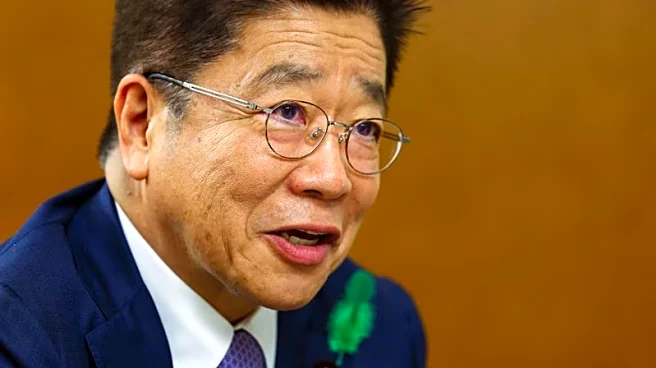By Leika Kihara and Makiko Yamazaki
TOKYO (Reuters) -Japan's government on Friday brushed aside rare and explicit comments from U.S. Treasury Secretary Scott Bessent who said the Bank of Japan was "behind
the curve" on policy, which appeared to be aimed at pressuring the country's central bank into raising interest rates.
However, some analysts saw Bessent's comments, coupled with unexpectedly solid domestic growth data, as heightening the chance of a near-term rate hike by the BOJ - a view that pushed up Japanese government bond (JGB) yields and the yen on Friday.
"It's a sign from the U.S. that they're watching BOJ policy carefully," Yuji Saito, executive advisor to SBI FX Trade, said of Bessent's comments, adding that markets are pricing in the chance of an BOJ rate hike in the next few months.
"With Bessent's comments and today's GDP, the BOJ may see itself cornered" into raising rates, he added.
In his most explicit comments on Japan's monetary policy, Bessent told Bloomberg on Wednesday the BOJ will likely be hiking rates as it had an "inflation problem" and could be "behind the curve" in dealing with upward price risks.
The comments came as rising food and raw material costs have kept Japan's core inflation above the central bank's 2% target for well over three years, causing some BOJ policymakers to worry about second-round price effects.
Japan's economic revitalisation minister Ryosei Akazawa, who also oversees trade talks with the U.S., brushed aside the view Bessent was pressuring the BOJ to hike rates.
"He absolutely was not calling on the BOJ to raise rates," and was only predicting it could do so, Akazawa told a news conference on Friday.
Finance minister Katsunobu Kato declined to comment when asked about Bessent's comments in a news conference on Friday.
Some analysts, however, saw Bessent's comments as an escalation of Washington's pressure on Japan to help address the huge U.S. trade deficit by weakening the dollar, such as by pushing up the yen through tighter monetary policy.
"Bessent's remarks may reflect the Trump administration's hope of using BOJ rate hikes to reverse the weak-yen trend," said former BOJ board member Takahide Kiuchi, who is currently an economist at Nomura Research Institute.
"The BOJ may see the need to pay heed as refusing to hike for too long could anger the U.S., and turn into a diplomatic headache for Japan," he said. "Such U.S. calls may escalate and add to the case for a near-term BOJ rate hike."
Prospects of a near-term rate hike pushed up the yen and Japanese government bond (JGB) yields. The yield on the benchmark 10-year note rose 1 basis point to 1.56% on Friday after hitting a two-week high of 1.565%.
Japan's unexpectedly strong second-quarter gross domestic product (GDP) data on Friday also pushed up the yen by easing concern about the economic outlook, analysts say.
Bessent - who oversees Washington's trade and exchange-rate talks with Tokyo - has repeatedly signalled his preference for tighter Japanese monetary policy.
In its exchange-rate report to Congress in June, the U.S. Treasury Department said the BOJ should keep tightening policy, which would support a "normalization of the yen's weakness."
The BOJ next meets for a policy meeting in September. In its October review, it will also conduct a quarterly review of its economic growth and price projections.
A Reuters poll last month showed a majority of economists expected another rate hike by year-end. Swap rates indicate a 43% chance of a BOJ rate hike by October and a 66% chance by the end of this year, according to estimates by Japan's Okasan Securities.
(Reporting by Leika Kihara and Makiko Yamazaki; additional reporting by Takaya Yamaguchi and Yoshifumi Takemoto; Editing by Clarence Fernandez, Sam Holmes and Kim Coghill)









